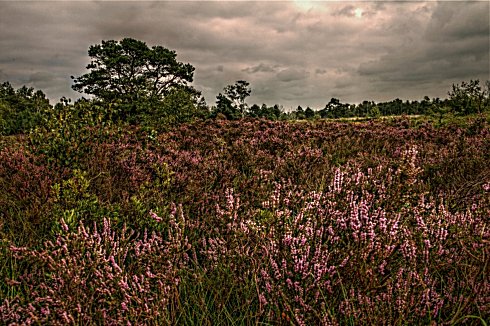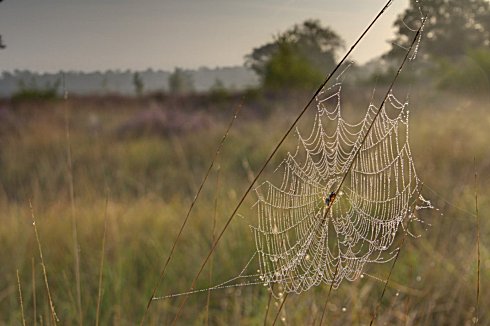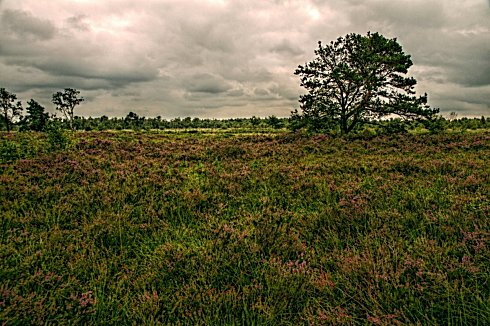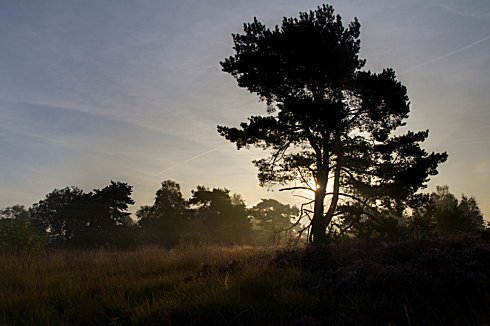Fleurs du Mal Magazine


Or see the index
.jpg)
Lola Ridge
(1873-1941)
THE SONG OF IRON
I
Not yet hast Thou sounded
Thy clangorous music,
Whose strings are under the mountains…
Not yet hast Thou spoken
The blooded, implacable Word…
But I hear in the Iron singing–
In the triumphant roaring of the steam and pistons pounding–
Thy barbaric exhortation…
And the blood leaps in my arteries, unreproved,
Answering Thy call…
All my spirit is inundated with the tumultuous passion of Thy Voice,
And sings exultant with the Iron,
For now I know I too am of Thy Chosen…
Oh fashioned in fire–
Needing flame for Thy ultimate word–
Behold me, a cupola
Poured to Thy use!
Heed not my tremulous body
That faints in the grip of Thy gauntlet.
Break it… and cast it aside…
But make of my spirit
That dares and endures
Thy crucible…
Pour through my soul
Thy molten, world-whelming song.
… Here at Thy uttermost gate
Like a new Mary, I wait…
II
Charge the blast furnace, workman…
Open the valves–
Drive the fires high…
(Night is above the gates).
How golden-hot the ore is
From the cupola spurting,
Tossing the flaming petals
Over the silt and furnace ash–
Blown leaves, devastating,
Falling about the world…
Out of the furnace mouth–
Out of the giant mouth–
The raging, turgid, mouth–
Fall fiery blossoms
Gold with the gold of buttercups
In a field at sunset,
Or huskier gold of dandelions,
Warmed in sun-leavings,
Or changing to the paler hue
At the creamy hearts of primroses.
Charge the converter, workman–
Tired from the long night?
But the earth shall suck up darkness–
The earth that holds so much…
And out of these molten flowers,
Shall shape the heavy fruit…
Then open the valves–
Drive the fires high,
Your blossoms nurturing.
(Day is at the gates
And a young wind…)
Put by your rod, comrade,
And look with me, shading your eyes…
Do you not see–
Through the lucent haze
Out of the converter rising–
In the spirals of fire
Smiting and blinding,
A shadowy shape
White as a flame of sacrifice,
Like a lily swaying?
III
The ore leaping in the crucibles,
The ore communicant,
Sending faint thrills along the leads…
Fire is running along the roots of the mountains…
I feel the long recoil of earth
As under a mighty quickening…
(Dawn is aglow in the light of the Iron…)
All palpitant, I wait…
IV
Here ye, Dictators–late Lords of the Iron,
Shut in your council rooms, palsied, depowered–
The blooded, implacable Word?
Not whispered in cloture, one to the other,
(Brother in fear of the fear of his brother…)
But chanted and thundered
On the brazen, articulate tongues of the Iron
Babbling in flame…
Sung to the rhythm of prisons dismantled,
Manacles riven and ramparts defaced…
(Hearts death-anointed yet hearing life calling…)
Ankle chains bursting and gallows unbraced…
Sung to the rhythm of arsenals burning…
Clangor of iron smashing on iron,
Turmoil of metal and dissonant baying
Of mail-sided monsters shattered asunder…
Hulks of black turbines all mangled and roaring,
Battering egress through ramparted walls…
Mouthing of engines, made rabid with power,
Into the holocaust snorting and plunging…
Mighty converters torn from their axis,
Flung to the furnaces, vomiting fire,
Jumbled in white-heaten masses disshapen…
Writhing in flame-tortured levers of iron…
Gnashing of steel serpents twisting and dying…
Screeching of steam-glutted cauldrons rending…
Shock of leviathans prone on each other…
Scaled flanks touching, ore entering ore…
Steel haunches closing and grappling and swaying
In the waltz of the mating locked mammoths of iron,
Tasting the turbulent fury of living,
Mad with a moment’s exuberant living!
Crash of devastating hammers despoiling..
Hands inexorable, marring
What hands had so cunningly moulded…
Structures of steel welded, subtily tempered,
Marvelous wrought of the wizards of ore,
Torn into octaves discordantly clashing,
Chords never final but onward progressing
In monstrous fusion of sound ever smiting on sound
in mad vortices whirling…
Till the ear, tortured, shrieks for cessation
Of the raving inharmonies hatefully mingling…
The fierce obligato the steel pipes are screaming…
The blare of the rude molten music of Iron…
LOLA RIDGE POETRY
kempis poetry magazine
More in: Ridge, Lola
.jpg)
Ed Schilders
Pietro Aretino
De geschiedenis van een reputatie
Acht
Waarschijnlijk heeft Casanova dit boekje later van Marina Pisani cadeau gekregen want verderop in ditzelfde deel noemt hij het als een werk dat deel uitmaakt van zijn bibliotheek, naast de werken van ‘Arioste, Horace, Pétrarque’. Aretino, of wat daarvoor doorgaat, noemt hij dan le petit livre des postures lubriques de l’Arétin. . .
Het zou interessant zijn te weten welke de vier ‘Aretino Y waren die Casanova fort intéressantesvond. Zijn werk geeft, dat lijkt geen onrechtmatige conclusie, slechts uitsluitsel over één positie. Dat is de arbre droit, die we Casanova — nog steeds in deel 4 — zien uitvoeren met een zekere M.M. nadat deze, uitgeput door de voorgaande luttes, zich op een Perzisch tapijt heeft uitgestrekt. Ik heb haar de rechte boom doen toepassen en in deze houding heb ik haar omhooggetild om haar liefdeskabinet te verorberen, dat ik op geen andere wijze kon bereiken aangezien ik ook haar in staat wilde stellen het wapen te proeven dat haar dodelijk verwondde zonder haar van het leven te beroven. Het is even puzzelen maar het is dan duidelijk dat Casanova hier aan het experimenteren is met wat tegenwoordig soixante-neuf genoemd zou worden, de heer geknield boven de dame. De naam van de stand, arbre droit, lijkt dan aardig gekozen. Het gebeuren krijgt echter niet de door Casanova gewenste afronding, de boom valt om, tussen haar borsten. Pas in het twaalfde deel lijkt het hem te lukken de arbre droit te volvoeren zoals Aretino het voorschrijft maar ook dan is Eros hem slecht gezind.
Casanova beschrijft dan zijn relatie met Lia die hem, net als het prototype van de teaser La Charpillon, voortdurend aan het lijntje houdt.
Om haar lusten op te wekken heeft hij weer gebruik gemaakt van het boekje met de Aretino’s, maar dagenlang blijven zijn lessen beperkt tot theorie. Op een avond ontdekt hij haar echter in het gezelschap van een jongeman. Hij bespiedt hen en stelt vast dat ‘Lia niets anders deed dan de figuren herhalen die ze uit haar hoofd had geleerd uit de Aretino.’ Niettemin windt het slot hem zeer op: ‘In de houding van de arbre droit de l’homme (de vrouw boven), ging Lia te werk als een echte saphiste, en de jongeman smulde van haar pronkjuweel.
Tenslotte volgt de afronding waarop hij zelf zijn zinnen gezet heeft en waarvan hij ook vanuit zijn voyeurspositie volop geniet: . . . et ne la voyant pas cracher à la fin de l’acte, je fus sûr qu’elle s’était nourrie du nectar de mon heureux rival.1) Casanova identificeert zijn Aretino steeds weer met het oraal-genitale contact, variaties die in de Sonetti niet voorkomen. Ook in deel acht, in zijn favoriete situatie, de ménage à trois, nu met Hedvige en Hélène, laat hij de dames eerst ‘de moeilijkste houdingen uit Aretino uitvoeren’, met de toevoeging, ‘wat hen onzegbaar amuseerde’, maar streeft hij tenslotte toch weer naar een fellatoir slot: la décharge partit et inonda son (Hedvige) visage et son sein.
Aretino’s grootste bewonderaar moet echter wel de Seigneur de Brantôme geweest zijn, gezien de vele verwijzingen naar de modi in zijn Vie des Dames Galantes. Brantôme begon aan dit superieure voorbeeld van roddelliteratuur tegen het eind van 1583 toen hij na een val van zijn paard vier jaar lang het bed moest houden. Hij overleed op ongeveer 74-jarige leeftijd (zijn geboortedatum wordt op circa 1540 geschat) zonder dat dit nu bekendste deel van zijn oeuvre gepubliceerd was. In zijn testament schreef hij echter nadrukkelijk: Je veux aussy, et en charge expressément mes héritiers, héritières, de faire imprimer mes livres, que j’ay faictz et composez de mon esprit et invention . . .8) Pas in 1665 of 1666 werd Vie des Dames Galantes in ons land voor het eerst gedrukt.
Na enige welgekozen voorbeelden van ‘overspel’ begint Brantôme een nieuwe alinea met de woorden: ‘Nog erger is dat deze mannen hun vrouw in hun eigen bed duizend-en-een ontuchtigheden, genietingen, verleidelijke poses en nieuwe standjes leren, zelfs de ontstellende houdingen van Aretino proberen, zodat het vuur van hun hartstocht honderdvoudig brandt en ze vanzelf ontuchtig worden.’
Het verband met het overspel wordt als volgt gelegd: ‘En als ze eenmaal zodanig afgericht zijn, kunnen ze zich niet meer weerhouden om hun mannen te verlaten op zoek naar andere minnaars.’ 9)
Dat het portfolio niet het alleenrecht van de mannen geweest is merken we verderop in het eerste hoofdstuk als Brantôme over een ‘mooie eerzame dame’ schrijft die ‘een geïllustreerde Aretino in haar kleedkamer bewaarde’, met toestemming van haar man. Haar begaafdheid in sexuele toepassingen heeft ze ‘zowel van het boek als door oefening’ geleerd. Over het succes van de ‘standen’ komen we iets meer te weten als Brantôme schrijft dat hij in Parijs een boekhandelaar gekend heeft, Bernardo geheten, een Italiaan, die ‘in nog geen jaar tijds ruim vijftig exemplaren had verkocht van de werken van Aretino’, en hij voegt er aan toe, ‘aan getrouwde zowel als ongetrouwde mannen, en ook aan vrouwen.’ Deze exemplaren waren gebonden ‘in fraaie leren banden’, werden verkocht aan de rijken, en dat in het grootste geheim. De boekhandelaar ‘vertelde me ook dat er een tijdje later een dame was gekomen die had gevraagd of hij niet nog zo’n boek had als de Aretino die ze . . . gezien had. Hij antwoordde: “Signora, si, e peggio.” (Ja mevrouw, nog iets ergers.) En meteen haalde ze geld tevoorschijn en betaalde voor de boeken hun gewicht in goud. Zo dol nieuwsgierig was ze om alles te proberen en haar man op reis te sturen naar Hoorndragersland, Corneto bij Civita-vecchia.’ En hij voegt er aan toe: ‘Al deze standjes en houdingen zijn een ergernis voor God’, maar dat meent hij niet echt. Toepassing en navolging van het idee moeten veelvuldig geweest zijn. Brantôme schrijft over een ‘zilveren drinkbeker (. . .) Met de graveernaald waren hierin heel zorgvuldig en bekoorlijk verscheidene voorstellingen van Aretino afgebeeld’, en alsof we dat nu nog niet weten voegt hij er nogmaals aan toe: ‘liefdeshoudingen van man en vrouw.’
Bijna giechelend vertelt hij dan hoe deze voorstellingen onder in de beker staan, en hoe de heren de dames, die niets vermoeden, uit die beker laten drinken. Niet zonder succes: ‘Een enkele zocht het buitenshuis om de houdingen van Aretino te beproeven, want een mens die niet is afgestompt wil alles proberen’! Erotisch versierd drank- en eetgerei moet in de zestiende eeuw zeer in zwang geweest zijn aan de hoven van Frankrijk en Italië. Fuchs geeft hierover een groot aantal berichten en fraaie afbeeldingen. Zo schrijft bij voorbeeld een Hertogin van Orléans in een van haar brieven over Catharirta de Medicis: ‘Koningin Catharina was een in-slechte vrouw. Haar oom, de paus, had groot gelijk toen hij zei, dat hij Frankrijk een slecht geschenk had gegeven. Men zegt dat ze haar jongste zoon vergiftigd heeft, en men heeft haar eens in een bordeel aangetroffen waar ze incognito was heengegaan om zich te verlustigen. Geen wonder dus dat ze ook uit een schaal met Aretino’s standen gezopen heeft.’ Philips van Bourgondië zou zijn tafel hebben laten opsieren door een fraai gouden beeld van een naakte Venus uit wier schaamdelen de wijn geschonken kon worden.
(wordt vervolgd)
Ed Schilders: Pietro Aretino. De geschiedenis van een reputatie
.jpg)
fleursdumal.nl magazine
More in: Aretino, Pietro, Ed Schilders, Erotic literature

O s c a r W i l d e
(1854-1900)
The Grave Of Shelley
Like burnt-out torches by a sick man’s bed
Gaunt cypress-trees stand round the sun-bleached stone;
Here doth the little night-owl make her throne,
And the slight lizard show his jewelled head.
And, where the chaliced poppies flame to red,
In the still chamber of yon pyramid
Surely some Old-World Sphinx lurks darkly hid,
Grim warder of this pleasaunce of the dead.
Ah! sweet indeed to rest within the womb
Of Earth, great mother of eternal sleep,
But sweeter far for thee a restless tomb
In the blue cavern of an echoing deep,
Or where the tall ships founder in the gloom
Against the rocks of some wave-shattered steep.
.jpg)
O s c a r W i l d e p o e t r y
k e m p i s p o e t r y m a g a z i n e
More in: Wilde, Oscar
.jpg)
William Shakespeare
(1564-1616)
THE SONNETS
50
How heavy do I journey on the way,
When what I seek (my weary travel’s end)
Doth teach that case and that repose to say
‘Thus far the miles are measured from thy friend.’
The beast that bears me, tired with my woe,
Plods dully on, to bear that weight in me,
As if by some instinct the wretch did know
His rider loved not speed being made from thee:
The bloody spur cannot provoke him on,
That sometimes anger thrusts into his hide,
Which heavily he answers with a groan,
More sharp to me than spurring to his side,
For that same groan doth put this in my mind,
My grief lies onward and my joy behind.
![]()
kempis poetry magazine
More in: -Shakespeare Sonnets
.jpg)

Aftermath
by Henry Wadsworth Longfellow
(1807 – 1882)
When the summer fields are mown,
When the birds are fledged and flown,
And the dry leaves strew the path;
With the falling of the snow,
With the cawing of the crow,
Once again the fields we mow
And gather in the aftermath.
Not the sweet, new grass with flowers
Is this harvesting of ours;
Not the upland clover bloom;
But the rowen mixed with weeds,
Tangled tufts from marsh and meads,
Where the poppy drops its seeds
In the silence and the gloom.


Hans Hermans Natuurdagboek Oktober 2010
Poem: Henry Wadsworth Longfellow
kempis poetry magazine
More in: Hans Hermans Photos, Longfellow, Henry Wadsworth
![]()
Gabriele D’Annunzio
(1863-1938)
To An Impromptu Of Chopin
When thou upon my breast art sleeping,
I hear across the midnight gray–
I hear the muffled note of weeping,
So near–so sad–so far away!
All night I hear the teardrops falling–
Each drop by drop–my heart must weep;
I hear the falling blood-drops–lonely,
Whilst thou dost sleep–whilst thou dost sleep.

Gabriele D’Annunzio poetry
fleursdumal.nl magazine
More in: D'Annunzio, Gabriele
![]()
Max Elskamp
(1862-1931)
La Femme
Mais maintenant vient une femme,
Et lors voici qu’on va aimer,
Mais maintenant vient une femme
Et lors voici qu’on va pleurer,
Et puis qu’on va tout lui donner
De sa maison et de son âme,
Et puis qu’on va tout lui donner
Et lors après qu’on va pleurer
Car à présent vient une femme,
Avec ses lèvres pour aimer,
Car à présent vient une femme
Avec sa chair tout en beauté,
Et des robes pour la montrer
Sur des balcons, sur des terrasses,
Et des robes pour la montrer
A ceux qui vont, à ceux qui passent,
Car maintenant vient une femme
Suivant sa vie pour des baisers,
Car maintenant vient une femme,
Pour s’y complaire et s’en aller.
• fleursdumal.nl magazine
More in: Archive E-F, Archive E-F, Elskamp, Max
.jpg)
E m i l y D i c k i n s o n
(1830-1886)
If you were coming in the fall
If you were coming in the fall,
I’d brush the summer by
With half a smile and half a spurn,
As housewives do a fly.
If I could see you in a year,
I’d wind the months in balls,
And put them each in separate drawers,
Until their time befalls.
If only centuries delayed,
I’d count them on my hand,
Subtracting till my fingers dropped
Into Van Diemen’s land.
If certain, when this life was out,
That yours and mine should be,
I’d toss it yonder like a rind,
And taste eternity.
But now, all ignorant of the length
Of time’s uncertain wing,
It goads me, like the goblin bee,
That will not state its sting.
.jpg)
Emily Dickinson poetry
k e m p i s p o e t r y m a g a z i n e
More in: Dickinson, Emily
.jpg)
A l f o n s i n a S t o r n i
(1892-1938)
I Am Going To Sleep
(Suicide note)
Teeth of flowers, hairnet of dew,
hands of herbs, you, perfect wet nurse,
prepare the earthly sheets for me
and the down quilt of weeded moss.
I am going to sleep, my nurse, put me to bed.
Set a lamp at my headboard;
a constellation; whatever you like;
all are good: lower it a bit.
Leave me alone: you hear the buds breaking through . . .
a celestial foot rocks you from above
and a bird traces a pattern for you
so you’ll forget . . . Thank you. Oh, one request:
if he telephones again
tell him not to keep trying for I have left . . .
![]()
Alfonsina Storni poetry
fleursdumal.nl magazine
More in: Archive S-T, Archive S-T, Storni, Alfonsina, Suicide
.jpg)

Dirge in Woods
by George Meredith
(1828 – 1909)
A wind sways the pines,
And below
Not a breath of wild air;
Still as the mosses that glow
On the flooring and over the lines
Of the roots here and there.
The pine-tree drops its dead;
They are quiet, as under the sea.
Overhead, overhead
Rushes life in a race,
As the clouds the clouds chase;
And we go,
And we drop like the fruits of the tree,
Even we,
Even so.


Photos: Hans Hermans 2010 – Natuurdagboek september 2010
Poem: George Meredith
kempis poetry magazine
More in: Hans Hermans Photos, Meredith, George
.jpg)
C h a r l e s C r o s
(1842-1888)
U n i m m e n s e d é s e s p o i r
Un immense désespoir
Noir
M’atteint
Désormais, je ne pourrais
M’égayer au rose et frais
Matin.
Et je tombe dans un trou
Fou,
Pourquoi
Tout ce que j’ai fait d’efforts
Dans l’Idéal m’a mis hors
La Loi ?
Satan, lorsque tu tombas
Bas,
Au moins
Tu payais tes voeux cruels,
Ton crime avait d’immortels
Témoins.
Moi, je n’ai jamais troublé,
Blé,
L’espoir
Que tu donnes aux semeurs
Cependant, puni, je meurs
Ce soir.
J’ai fait à quelque animal
Mal
Avec
Une badine en chemin,
Il se vengera demain
Du bec.
Il me crèvera les yeux
Mieux
Que vous
Avec l’épingle à chapeau
Femmes, au contact de peau
Si doux.
.jpg)
Charles Cros poetry
k e m p i s p o e t r y m a g a z i n e
More in: Archive C-D, Cros, Charles
.jpg)
Ton van Reen
De mannen van Sankaber
Alle mannen van Sankaber zijn ruiters
dag en nacht rijden ze de rotsige hellingen op en af,
rechtop zittend op hun Arabische kleppers,
slanke, hitsige paarden, die als ze met de zweep krijgen
als jeeps optrekken, behendig de rotsen ontwijkend
Hoewel de ruiters altijd haast hebben
lijkt het of ze achteloos door elkaar draven
en altijd van nergens naar nergens rijden
of ze alleen maar rijden om elkaar te ontmoeten
doordat hun hoofddoeken achter hen aan waaien
is het net alsof hun paarden vleugels hebben
‘Salama, salama,’ roepen ze als ze op elkaar inrijden
als ridders in een toernooi, elkaar net ontwijkend
elkaar alleen rakend met hun vleugels, ‘salama’
‘Salama, salama,’ klinkt het de hele dag door
tot het donker wordt en de ruiters in de nacht verdwijnen
alleen het ‘salama, salama’ wordt nog gehoord
boven het geklepper van de paarden en de klappende zwepen
Ton van Reen poetry: De naam van het mes. Afrikaanse gedichten
kempis poetry magazine
More in: -De naam van het mes, Ton van Reen
Thank you for reading Fleurs du Mal - magazine for art & literature